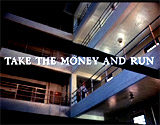
|
Take the
Money and Run (1969)
In co-writer/director Woody Allen's early crime-related
comedy (Allen's first feature that he acted in, directed, and wrote):
- the sight of neurotic cello player Virgil Starkwell
(Woody Allen) playing in a marching band
- the mockumentary interview with Virgil's embarrassed
parents (who both wore Groucho Marx disguises)
- the scene of one of many of Virgil's failed, compulsive
escape attempts from prison, when his self-made soap gun melted in
a sudden rainstorm
- the scene of Virgil agreeing to an experimental vaccine
in prison in order to be paroled - temporarily turning him into a
rabbi ("one temporary side effect")
- the scene of Virgil needing money to get married,
leading to a bank robbery by the nebbish crook - including his handwritten,
mis-spelled and illegible stickup note for $50,000 (and the subsequent
discussion with two bank tellers as the note was passed along): ("Does
this look like "gub"
or "gun"? - Teller: "But what does "abt" mean?"
- Virgil: "It's "act". A-C-T. Act natural")
- the narrator's description of his undernourishment
when served only one meal a day on the chain gang: "Food on
a chain gang is scarce and not very nourishing. The men get one hot
meal a day: a bowl of steam"
- Virgil's interview in his prison cell after being
sentenced to 800 years in federal prison, and was confident he could
cut the sentence in half; he asserted:
"I think crime definitely pays. And you know, it's a great job,
the hours are good, and you're your own boss. And you travel a lot,
and you get to meet interesting people, and uh, I just think it's a
good job in general"; and then he described his time carving work
in shop (making another soap-gun) and inquired (with the film's last
line):
"Do you know if it's raining out?"
|
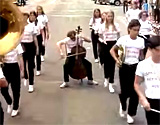
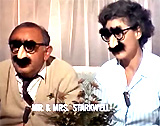
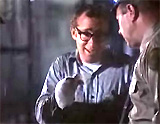
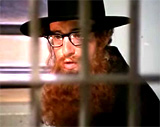
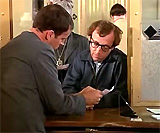
|






